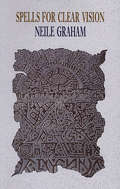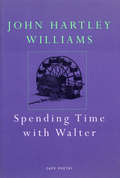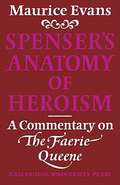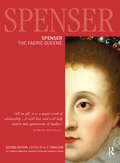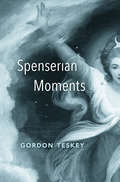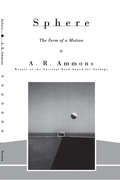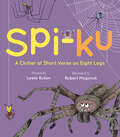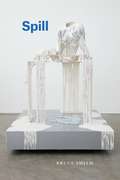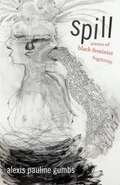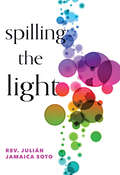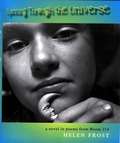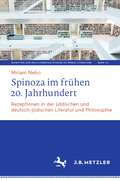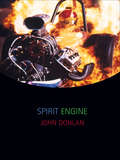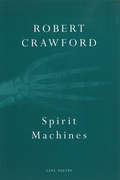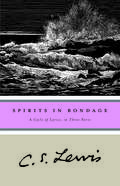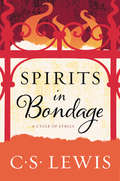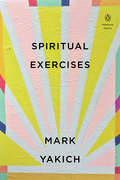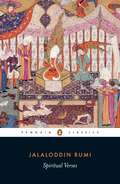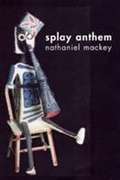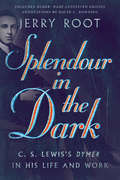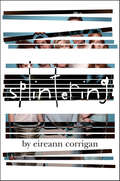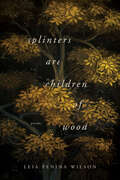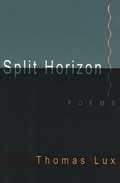- Table View
- List View
Spells for Clear Vision
by Neile GrahamShortlisted for the 1994 Pat Lowther Award "I believe in the common magic/ of forests and household godd" writes Neile Graham in "Spells for Clear Vision," the title poem of this volume. And it is a common magic which she works in this poetry of delicate attentions. Graham writes about trying to see clearly, about trying to articulate ways of living in a modern, often blinding world. Meditative, individual and ever-open to the intricate and shifting world around her, Graham's is a pensive and a thoughtful eye. Her poetry thinks through and with sight; it turns on a perceptiveness which is at once sensual and quietly, accessibly, intelletual. How Graham sees her world will alter how we see ours.
Spending Time With Walter
by John Hartley WilliamsThe long poem at the centre of John Hartley Williams' new collection is a dramatic monologue narrated by a laconic, possibly lamed, forest dweller, a lowly crewmember on a barge travelling an unnamed waterway. Some of his remarks are addressed to his talisman, the shrunken head of an African tribesman. The barge carries a sinister cargo and its captain has a preference for sadistic sex. Other poems in the book undertake journeys - to Northern Cyprus, China, medieval France, Florida - but like 'The Barge' they're not exactly travel poems, more poems which travel. Welcome to the unsettling world of John Hartley Williams, whose restless, inexhaustible imagination, originality and maverick humour have enlivened contemporary poetry for years. Paranoid, erotic, disturbed and disturbing, these are bulletins from a dislocated, parallel world that excites, entertains and terrifies - and often feels more real to us than our own.
Spenser's Anatomy Of Heroism: A Commentary On 'the Faerie Queene'
by Maurice EvansThis book is a study of Spenser's conception of the nature of heroism and the way it is embodied in the separate books of The Faerie Queene. Professor Evans stresses the coherence of Spenser's scheme of virtues and examines the fusion of Christian symbol and classic myth through which the underlying Christian theme is expressed. He emphasises the didactic purpose of the poem, and the rhetorical method by which the allegory works upon the reader. It is his contention that Spenser completed his poem, and that The Faerie Queene as it stands presents an organic unity so firmly controlled that it is unprofitable to consider any book, canto or even single verse isolation from the poem as a whole. The complexity of the poetry which this study reveals suggests that Spenser has much in common with the metaphysicals, while the subtle dissection of human motive and behaviour within the poem would place him in closer relationship to the drama than is normally recognised.
Spenser's International Style
by David Scott Wilson-OkamuraWhy did Spenser write his epic, The Faerie Queene, in stanzas instead of a classical meter or blank verse? Why did he affect the vocabulary of medieval poets such as Chaucer? Is there, as centuries of readers have noticed, something lyrical about Spenser's epic style, and if so, why? In this accessible and wide-ranging study, David Scott Wilson-Okamura reframes these questions in a larger, European context. The first full-length treatment of Spenser's poetic style in more than four decades, it shows that Spenser was English without being insular. In his experiments with style, Spenser faced many of the same problems, and found some of the same solutions, as poets writing in other languages. Drawing on classical rhetoric and using concepts that were developed by literary critics during the Renaissance, this is an account of long-term, international trends in style, illustrated with examples from Petrarch, Du Bellay, Ariosto, and Tasso.
Spenser: The Faerie Queene (Longman Annotated English Poets)
by A. C. HamiltonThe Faerie Queene is a scholarly masterpiece that has influenced, inspired, and challenged generations of writers, readers and scholars since its completion in 1596. Hamilton's edition is itself, a masterpiece of scholarship and close reading. It is now the standard edition for all readers of Spenser. The entire work is revised, and the text of The Faerie Queene itself has been freshly edited, the first such edition since the 1930s. This volume also contains additional original material, including a letter to Raleigh, commendatory verses and dedicatory sonnets, chronology of Spenser's life and works and provides a compilation of list of characters and their appearances in The Faerie Queene.
Spenserian Moments
by Gordon TeskeyGordon Teskey restores Edmund Spenser to prominence, revealing his epic The Faerie Queene as a grand, improvisatory project on human nature. Teskey compares Spenser to Milton, an avowed follower. While Milton’s rigid ideology is now stale, Spenser’s allegories remain vital, inviting new questions and visions, heralding a constantly changing future.
Sphere: The Form Of A Motion
by A. R. Ammons"There wasn't one page of his poem that didn't delight me."—Donald Davie, New York Review of Books Sphere is the second of A. R. Ammons's long poems—following Tape for the Turn of the Year and preceding Garbage—that mark him as a master of this particular form. The sphere in question is the earth itself, and Ammons's wonderfully stocked mind roams globally, ruminating on subjects that range from galaxies to gas stations. It is a remarkable achievement, comparable in importance to Wallace Stevens's Notes Toward a Supreme Fiction.
Spi-ku: A Clutter of Short Verse on Eight Legs
by Leslie BulionLeslie Bulion, award-winning educator favorite and master of science poetry, is back with a humorous exploration of the silk-spinning, bungee-jumping, hunting, trapping, trick-filled world of spiders!Meet spiders that spit silk, roll like wheels, scuba dive, hide under trap doors, strum tunes, and so much more. Watch as they find mates, find prey...or find mates that become prey!Award-winning poet Leslie Bulion and illustrator Robert Meganck team up again for this clutter (a collective noun for spiders) of short poems and humorously accurate illustrations celebrating the amazing attributes of Araneae. The book is also packed with helpful sidebars, call-outs, and back matter, including a glossary of science terms, a description of the poetic forms, a list of common and scientific names, a spider-hunting adventure how-to, resources for further study, and a relative-size chart. A feast for science and animal fans!
Spill (Phoenix Poets)
by Bruce Smith“There are two schools: one that sings the sheen and hues, the necessary pigments and frankincense while the world dries and the other voice like water that seeks to saturate, erode, and boil . . . It ruins everything you have ever saved.” Spill is a book in contradictions, embodying helplessness in the face of our dual citizenship in the realms of trauma and gratitude, artistic aspiration and political reality. The centerpiece of this collection is a lyrical essay that recalls the poet’s time working at the Federal Penitentiary at Lewisburg in the 1960s. Mentored by the insouciant inmate S, the speaker receives a schooling in race, class, and culture, as well as the beginning of an apprenticeship in poetry. As he and S consult the I Ching, the Book of Changes, the speaker becomes cognizant of other frequencies, other identities; poetry, divination, and a synchronous, alternative reading of life come into focus. On either side of this prose poem are related poems of excess and witness, of the ransacked places and of new territories that emerge from the monstrous. Throughout, these poems inhabit rather than resolve their contradictions, their utterances held in tension “between the hemispheres of songbirds and the hemispheres of men.”
Spill: Scenes of Black Feminist Fugitivity
by Alexis Pauline GumbsIn Spill, self-described queer Black troublemaker and Black feminist love evangelist Alexis Pauline Gumbs presents a commanding collection of scenes depicting fugitive Black women and girls seeking freedom from gendered violence and racism. In this poetic work inspired by Hortense Spillers, Gumbs offers an alternative approach to Black feminist literary criticism, historiography, and the interactive practice of relating to the words of Black feminist thinkers. Gumbs not only speaks to the spiritual, bodily, and otherworldly experience of Black women but also allows readers to imagine new possibilities for poetry as a portal for understanding and deepening feminist theory.
Spilling the Light
by Julián Jamaica SotoThe light must spill to shine. The thing you must be is yourself. Intimate and uncompromising, Rev. Julián Jamaica Soto’s debut collection Spilling the Light is a luminous offering to their communities and a defiant declaration of their worth in a world hostile to their queer, disabled, and brown being. “America, is this freedom?” they ask. “I cannot prove to you that / I am a person,” writing boldly of identity, community, liberation, and erasure through a prism of tender moments and powerful reckonings. These are poems of broken hallelujahs and codes/witching, of hunger and fire, of hope and resilience. They are complex, tender, and empowering. They embolden us to become our truest selves, willing us to survive.
Spinning Through the Universe: A Novel in Poems from Room 214
by Helen FrostEngrossing tales from the fifth grade. Unforgettable students in this fifth-grade classroom reveal their private feelings about birth and death, a missing bicycle and a first kiss, as well as their thoughts about recess, report cards, fitting in, and family. Using a rich array of traditional poetic forms, such as sonnets, sestinas, and acrostics, Helen Frost interweaves the stories of the kids in Room 214 and their teacher.
Spinoza im frühen 20. Jahrhundert: Rezeptionen in der jiddischen und deutsch-jüdischen Literatur und Philosophie (Schriften zur Weltliteratur/Studies on World Literature #14)
by Miriam NeboDie breite jüdische Spinoza-Rezeption hatte mit Moses Mendelssohn begonnen und fand in Deutschland im Jahr 1932 mit dem Spinoza-Jubiläum ein Ende. Die jüdische Auseinandersetzung ist Teil der gesamten deutschsprachigen Spinoza-Rezeption, die im 19. Jahrhundert ihren Höhepunkt hatte und zu der neben philosophischen auch literarische Rezeptionen gehörten. Am Ende des 19. Jahrhunderts setzte eine jiddische Spinoza-Rezeption ein. In der Zwischenkriegszeit entstanden eine Reihe von jiddischen Texten, die die Person Baruch Spinozas und seine Theorie thematisierten. Das Buch widmet sich der Untersuchung der Spinoza-Texte von Yankev Shatzky, Melech Ravitch, Avrom Koralnik, Avrom Sutzkever, H. Leivick und Yoysef Tunkler. Ihre Spinoza-Rezeptionen werden mit denen einiger deutsch-jüdischer Autoren und Autorinnen verglichen. Die Analysen der Abhandlung stehen in einem literaturwissenschaftlich-komparatistischen und jiddistischen Kontext, zu dem philosophisch orientierte Perspektiven hinzutreten. Zudem bietet das Buch eine kompakte Darstellung des Rezeptionsthemas ab 1670 (u.a. zu Goethe, Hölderlin, Heine).
Spirit Engine
by John DonlanJohn Donlan’s lyric work seeks the connection between lives—not just the life of a coyote and the life of a man, or the peaceful cacophony of a pond in summer and the life of the human listener—but between the life before birth, and the life after. He reveals the wilderness to us moment by moment, while simultaneously driving us back into our own nature—a process readers, lifted by Donlan’s imagery, rhythms, and insights, can only experience as pure pleasure. Here beauty is the engine that enspirits the mind, freeing us from contemporary despair and the illusion we’ve left nature behind. Devil’s Paintbrush. In my slow-burning archive orange hawkweed thrives in granite-charactered soil spalled off the basement stone, a beaver labours up her steep skid road logging poplar for food and shelter, wind drives rivers of ripples down a pond. Everything here knows what to do. I investigate every valve, work and rework notes to husks, skeletal remains, survivors who revive experience. I try to memorize, to make some pictures to walk into, in the final time when I can’t walk or hear or see, and see lake-cradling pink granite, its orange earth, its skin of lives flickering, flickering.
Spirit Machines
by Robert CrawfordSPIRIT MACHINES, Robert Crawford's fourth collection, attends imaginatively to the fusion of spiritual experience and the insistently material world. In several of the poems, emotional and religious insights merge lyrically with modern technologies of information. The title sequence deals with bereavement and memorializes the poet's father, who died in1997, while the serio-comical catechism of 'A Life-Exam' arises from the experience of hospitalisation. The imaginative, 360-line tour de force 'Impossibility' presents a swirling underwater world imaging the heroic struggle of the nineteenth-century writer and mother, Margaret Oliphant. While some of the poems communicate a sense of hurt and loss, others are insuperably comic, giving the collection an ambitious range and vitality. Throughout the book, Robert Crawford's alert sense of Scotland provides a source and sounding-board for poems -lyrics, ballads, verse narratives and prose poems - that are finely nuanced, moving, and excitingly resourceful.
Spirits In Bondage
by C. S. LewisPublished in 1919 when Lewis was only twenty, these early poems give an insight into the author's youthful agnosticism. The poems are written in various metrical forms, but are unified by a central idea, expressing his conviction that nature was malevolent and beauty the only true spirituality. Preface by Walter Hooper.
Spirits in Bondage: A Cycle of Lyrics
by C. S. LewisA repackaged edition of the revered author’s first book—a collection of poems, written in the wake of World War I, in which the young intellectual and soldier wrestles with the perplexing polarities of life, including love and war, evil and goodness, and other complex dichotomies.In 1919, C. S. Lewis—the great British writer, scholar, lay theologian, broadcaster, Christian apologist, and bestselling author of Mere Christianity, The Screwtape Letters, The Great Divorce, The Chronicles of Narnia, and many other beloved classics—published his first book, Spirits in Bondage, under the pseudonym Clive Hamilton. Written when Lewis was a student at Oxford and during the war when he served at the front in France, Spirits in Bondage reflects the intellectual and spiritual struggles of a young man wounded by war and conflicted over faith. As he contemplates the nature of morality, love, the presence of evil, the possibility of God, and other profound questions. Lewis reveals a side of himself unfamiliar to many readers.
Spiritual Exercises (Penguin Poets)
by Mark YakichA new collection from a poet of "wily verve" whose work is "filled with more satire and jeopardy than anything going today" (Terrance Hayes)Mark Yakich's fifth collection of poetry is a dynamic and discerning journey of devotion and temptation in pursuit of the divine. Not trifling in ambiguity but diving headlong into it, Spiritual Exercises wrestles with popular gods as much as with personal ghosts. From autism to eroticism, from benediction to excommunication, and from grief to gratitude, this collection lays bare a full spectrum of emotional life, showing us how grace can be as playful as it is sincere.
Spiritual Verses
by The Jalaluddin RumiBegun in 1262 AD, Masnavi-ye Ma ‘navi, or ‘spiritual couplets', is thought to be the longest single-authored ‘mystical’ poem ever written. As the spiritual masterpiece of the Persian Sufi tradition, it teaches how to progress to the ultimate goal of the Sufi path - union with God. Jalaloddin Rumi was a poet and a mystic, but he was first a teacher; in these verses he draws the reader into the complexities of human love and separation and explains the path to divine love through the elimination of self-regard and worldly desires. Drawing on diverse sources from bawdy tales and fables to stories of the prophet Mohammed, these verses are brief in expression yet copious in meaning.
Splay Anthem
by Nathaniel MackeyIn a stunning new collection of poems of transport and transcendence, African-American poet Nathaniel Mackey's "asthmatic song of aspiration" scuttles across cultures and histories from America to Andalucía, from Ethiopia to Vienna in a sexy, beautiful adaptive dance. Part antiphonal rant, part rhythmic whisper, Nathaniel Mackey's new collection of poems, Splay Anthem, takes the reader to uncharted poetic spaces. Divided into three sections "Braid," "Fray," and "Nub" (one referent Mackey notes in his stellar Introduction: "the imperial, flailing republic of Nub the United States has become, the shrunken place the earth has become, planet Nub") Splay Anthem weaves together two ongoing serial poems Mackey has been writing for over twenty years. In the cosmology of the Dogon of West Africa, the Andoumboulou are progenitor spirits, and the song of the Andoumboulou is a song addressed to the spirits, a funeral song, a song of rebirth. "Mu," too, splays with meaning: muni bird, Greek muthos, a Sun Ra tune, a continent once thought to have existed in the Pacific. With the vibrancy of a Miró painting, Mackey's poems trace the lost tribe of "we" through waking and dream time, through a multitude of geographies, cultures, histories, and musical traditions, as poetry here serves as the intersection of everything, myth's music, spirit lift.<P><P> Winner of the National Book Award
Splendour in the Dark: C. S. Lewis's Dymer in His Life and Work (Hansen Lectureship Series)
by Jerry RootSeveral years before he converted to Christianity, C. S. Lewis published a narrative poem, Dymer, under the pseudonym Clive Hamilton. Later, of course, Lewis became well known for his beloved imaginative stories, such as The Chronicles of Narnia and Till We Have Faces, as well as his ability to defend and articulate the faith in works such as Mere Christianity. But what about his literary work before his conversion? In this fourth volume in the Hansen Lectureship Series, Jerry Root contends that Lewis's early poem Dymer can not only shed light on the development of Lewis's literary skills but also offer a glimpse of what was to come in his intellectual and spiritual growth—a "splendour in the dark," to borrow one of Lewis's own lines from the poem. Under Root's careful analysis, Dymer becomes a way to understand both Lewis's change of mind as well as the way in which each of us is led on a journey of faith. This volume also includes the complete text of Dymer with annotations from David C. Downing, co-director of the Marion E. Wade Center. The Hansen Lectureship series offers accessible and insightful reflections by Wheaton College faculty members upon the transformative work of the Wade Center authors.
Splinter Factory
by Jeffrey McdanielWhether Jeffrey McDaniel is denouncing insomnia ("4,000 A.M."), exploring family tragedy ("Ghost Townhouse"), or celebrating love and lust ("The Biology of Numbers"), his writing is original and provocative. A noted poet, McDaniel has appeared on ABC's Nightline and NPR's Talk of the Nation. "Wild, fierce, irreverent, full of praise and lament, and deeply, intensely human." - Thomas Lux
Splintering
by Eireann CorriganFrom the remarkable author of YOU REMIND ME OF YOU, a searing novel in poems about a family falling apart.It's about the aftermath. It's about what happens after a stranger breaks into a house and attacks a family. It's about the sisters who must barricade themselves behind a splintering door while tethered on the phone to 911. It's about the father who nearly dies. It's about the son who hides. And everything after. Told in alternating perspectives, this is a powerful, moving story about a family that has its facade shattered by a random act of violence -- and must deal with what is discovered underneath.
Splinters Are Children of Wood: Poems (Ernest Sandeen Prize In Poetry Ser.)
by Leia Penina WilsonThe wildly unrestrained poems in Splinters Are Children of Wood, Leia Penina Wilson's second collection and winner of the Ernest Sandeen Prize in Poetry, pose an increasingly desperate question about what it means to be a girl, the ways girls are shaped by the world, as well as the role myth plays in this coming of age quest. Wilson, an afakasi Samoan poet, divides the book into three sections, linking the poems in each section by titles. In this way the poems act as a continuous song, an ode, or a lament revivifying a narrative that refuses to adopt a storyline.Samoan myths and Western stories punctuate this volume in a search to reconcile identity and education. The lyrical declaration is at once an admiration of love and self-loathing. She kills herself. Resurrects herself. Kills herself again. She is also killed by the world. Resurrected. Killed again. These poems map displacement, discontent, and an increasing suspicion of the world itself, or the ways people learn the world. Drawing on the work of Bhanu Kapil, Anne Waldman, Alice Notley, and Mei-mei Berssenbrugge, Wilson's poems reveal familiarity and strangeness, invocation and accusation. Both ritual and ruination, the poems return again and again to desire, myth, the sacred, and body
Split Horizon
by Thomas LuxThomas Lux is the author of such books as Sunday, Half Promised Land, and The Drowned River. His poetry has been fulfilling every expectation by penetrating deeper into the plain-spoken, saturnine, witty language that he virtually invented. In his latest work, Lux's level gaze, cool talk, weird rhythms, and quirky humor place him in a special territory - entirely original - of contemporary American poetry. These new poems, like Split Horizon itself, have unusual titles (Loudmouth Soup, Virgule,Each Startled Touch Returns the Touch Unstartled) and circle around their subjects in strange ways, most often dealing with the lonely oddity of the individual in a society that inflexibly ignores individuality.
